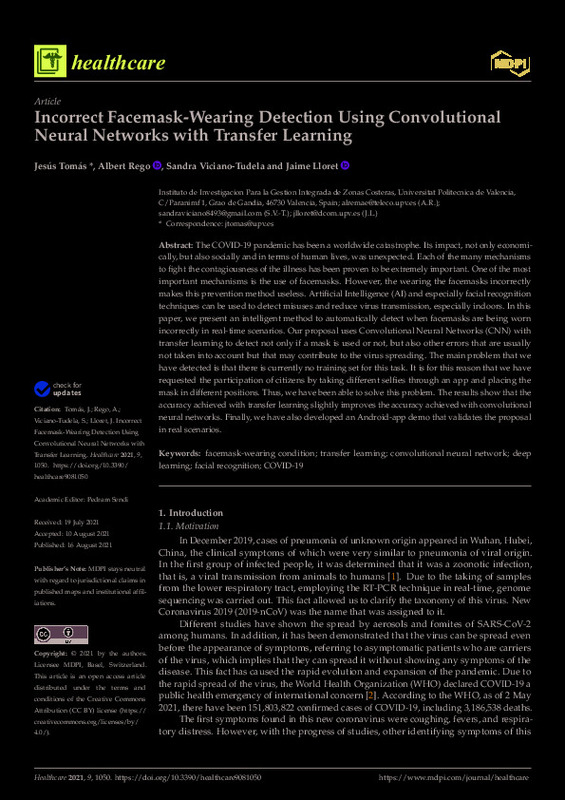JavaScript is disabled for your browser. Some features of this site may not work without it.
Buscar en RiuNet
Listar
Mi cuenta
Estadísticas
Ayuda RiuNet
Admin. UPV
Incorrect Facemask-Wearing Detection Using Convolutional Neural Networks with Transfer Learning
Mostrar el registro sencillo del ítem
Ficheros en el ítem
| dc.contributor.author | Tomás Gironés, Jesús
|
es_ES |
| dc.contributor.author | REGO MAÑEZ, ALBERT
|
es_ES |
| dc.contributor.author | Viciano-Tudela, Sandra
|
es_ES |
| dc.contributor.author | Lloret, Jaime
|
es_ES |
| dc.date.accessioned | 2022-10-21T18:03:12Z | |
| dc.date.available | 2022-10-21T18:03:12Z | |
| dc.date.issued | 2021-08 | es_ES |
| dc.identifier.uri | http://hdl.handle.net/10251/188552 | |
| dc.description.abstract | [EN] The COVID-19 pandemic has been a worldwide catastrophe. Its impact, not only economically, but also socially and in terms of human lives, was unexpected. Each of the many mechanisms to fight the contagiousness of the illness has been proven to be extremely important. One of the most important mechanisms is the use of facemasks. However, the wearing the facemasks incorrectly makes this prevention method useless. Artificial Intelligence (AI) and especially facial recognition techniques can be used to detect misuses and reduce virus transmission, especially indoors. In this paper, we present an intelligent method to automatically detect when facemasks are being worn incorrectly in real-time scenarios. Our proposal uses Convolutional Neural Networks (CNN) with transfer learning to detect not only if a mask is used or not, but also other errors that are usually not taken into account but that may contribute to the virus spreading. The main problem that we have detected is that there is currently no training set for this task. It is for this reason that we have requested the participation of citizens by taking different selfies through an app and placing the mask in different positions. Thus, we have been able to solve this problem. The results show that the accuracy achieved with transfer learning slightly improves the accuracy achieved with convolutional neural networks. Finally, we have also developed an Android-app demo that validates the proposal in real scenarios. | es_ES |
| dc.language | Inglés | es_ES |
| dc.publisher | MDPI AG | es_ES |
| dc.relation.ispartof | Healthcare | es_ES |
| dc.rights | Reconocimiento (by) | es_ES |
| dc.subject | Facemask-wearing condition | es_ES |
| dc.subject | Transfer learning | es_ES |
| dc.subject | Convolutional neural network | es_ES |
| dc.subject | Deep learning | es_ES |
| dc.subject | Facial recognition | es_ES |
| dc.subject | COVID-19 | es_ES |
| dc.subject.classification | INGENIERIA TELEMATICA | es_ES |
| dc.title | Incorrect Facemask-Wearing Detection Using Convolutional Neural Networks with Transfer Learning | es_ES |
| dc.type | Artículo | es_ES |
| dc.identifier.doi | 10.3390/healthcare9081050 | es_ES |
| dc.rights.accessRights | Abierto | es_ES |
| dc.contributor.affiliation | Universitat Politècnica de València. Instituto de Investigación para la Gestión Integral de Zonas Costeras - Institut d'Investigació per a la Gestió Integral de Zones Costaneres | es_ES |
| dc.contributor.affiliation | Universitat Politècnica de València. Departamento de Comunicaciones - Departament de Comunicacions | es_ES |
| dc.description.bibliographicCitation | Tomás Gironés, J.; Rego Mañez, A.; Viciano-Tudela, S.; Lloret, J. (2021). Incorrect Facemask-Wearing Detection Using Convolutional Neural Networks with Transfer Learning. Healthcare. 9(8):1-17. https://doi.org/10.3390/healthcare9081050 | es_ES |
| dc.description.accrualMethod | S | es_ES |
| dc.relation.publisherversion | https://doi.org/10.3390/healthcare9081050 | es_ES |
| dc.description.upvformatpinicio | 1 | es_ES |
| dc.description.upvformatpfin | 17 | es_ES |
| dc.type.version | info:eu-repo/semantics/publishedVersion | es_ES |
| dc.description.volume | 9 | es_ES |
| dc.description.issue | 8 | es_ES |
| dc.identifier.eissn | 2227-9032 | es_ES |
| dc.identifier.pmid | 34442187 | es_ES |
| dc.identifier.pmcid | PMC8391571 | es_ES |
| dc.relation.pasarela | S\473274 | es_ES |
| dc.contributor.funder | Universitat Politècnica de València |








